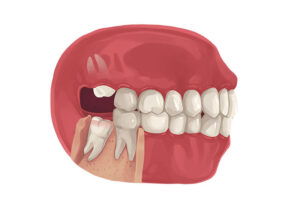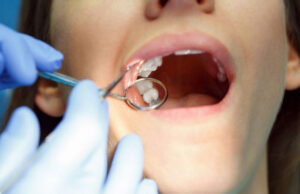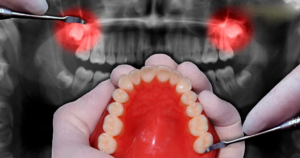Upper wisdom teeth are a common concern for many people due to the pain and potential complications they can cause. However, not everyone needs to have their wisdom teeth removed. In this article, Joy International Dental Clinic will help you understand whether extracting upper wisdom teeth is dangerous and provide you with detailed insights into this procedure. Let’s explore the topic together.
Content of table
Toggle1. Should You Extract Your Upper Wisdom Teeth?

Wisdom teeth are the last molars to emerge on the dental arch, usually appearing between the ages of 17 and 25. For some individuals, these teeth grow straight and do not cause pain or discomfort. However, in many cases, wisdom teeth may grow at an angle, become impacted, or push against neighboring teeth, leading to various dental issues.
So, should you have your upper wisdom teeth removed? The answer depends on your individual case and oral health condition. If your wisdom teeth grow properly without causing any problems, extraction may not be necessary. However, if they are misaligned or impacted, removing them is often the best solution to prevent further complications.
The most important step is to consult a reputable dental clinic, where specialists can assess your situation and provide the best advice for your dental health.
2. When Should or Shouldn’t You Extract Your Upper Wisdom Teeth?
2.1 When Should You Have Your Upper Wisdom Teeth Removed?

If you experience any of the following conditions, consider extracting your wisdom teeth:
- Impacted or misaligned teeth: If your wisdom teeth grow at an angle or fail to emerge fully, they may press against adjacent teeth, leading to persistent pain, inflammation, or even bad breath.
- Frequent pain, swelling, or gum disease: If your wisdom teeth are causing recurrent discomfort, swelling, or gum infections, extraction can provide long-term relief.
- Tooth decay: Wisdom teeth are positioned at the very back of your mouth, making them difficult to clean. As a result, they are more prone to decay. If left untreated, cavities can spread to neighboring teeth, affecting your overall oral health.
- Orthodontic treatment: If you are undergoing orthodontic procedures such as braces, wisdom teeth may interfere with tooth alignment. In such cases, removal is recommended to achieve optimal results.
2.2 When Is Wisdom Tooth Extraction Unnecessary?
- Properly aligned and healthy teeth: If your wisdom teeth grow straight without pressing against other teeth or affecting your bite, you can keep them.
- No oral health issues: If your wisdom teeth are not causing discomfort, infection, or cavities, there may be no urgent need for extraction.
- Medical conditions: People with specific health conditions, such as bleeding disorders, diabetes, or severe cardiovascular diseases, should consult their doctor and dentist before undergoing any extraction procedure.
3. Is Upper Wisdom Tooth Extraction Dangerous?

The thought of having a tooth extracted can be intimidating, especially when considering potential risks such as excessive bleeding, infection, or nerve damage. However, in reality, upper wisdom tooth extraction is generally less complicated and less risky than lower wisdom tooth extraction.
Why? Because the roots of upper wisdom teeth tend to be less curved and easier to access, making the procedure more straightforward. That being said, every dental procedure carries some level of risk, and wisdom tooth extraction is no exception.
Here are some potential complications to be aware of:
- Bleeding concerns: If you have a blood clotting disorder or are taking blood-thinning medications, bleeding may take longer to stop. Your dentist will assess your medical history and take necessary precautions.
- Infection risks: Failing to follow proper aftercare instructions can increase the risk of infection, leading to prolonged pain and delayed healing. Maintaining good oral hygiene is essential for a smooth recovery.
- Proximity to the sinus cavity: In some cases, upper wisdom teeth are located close to the maxillary sinus. If the dentist is not careful, an extraction could cause damage to the sinus membrane, leading to discomfort and complications.
To minimize risks, always choose a trusted dental clinic with experienced professionals.
4. Should You Remove Both Upper Wisdom Teeth at the Same Time?

Many people wonder whether it is safe to remove both upper wisdom teeth in one session. The answer depends on your overall health and the condition of your teeth.
Extracting both upper wisdom teeth simultaneously can reduce the number of visits to the dentist and shorten the overall recovery time. However, it may also lead to more discomfort in the initial days after the procedure, as both sides of the mouth may experience swelling or mild pain.
Your dentist will evaluate your specific situation and recommend the best approach. If your teeth are well-positioned and easy to remove, extracting both at once may be a convenient option. However, if you have underlying health concerns or more complex dental issues, your dentist may suggest removing them one at a time for a safer and more comfortable experience.
Conclusion
So, is upper wisdom tooth extraction dangerous? The answer is no—when performed by skilled professionals at a reputable dental clinic, it is a safe and routine procedure. If your wisdom teeth are causing problems, removing them will help you maintain good oral health and prevent future complications.
At Joy International Dental Clinic, we prioritize your safety and comfort. If you need expert advice on wisdom tooth extraction, book a consultation with us today for professional care and personalized treatment.






